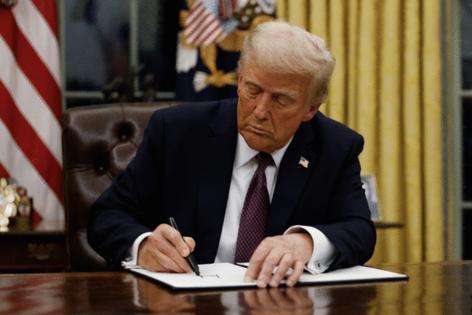Trump reverses some Biden health care policies. What it means for Maryland
Published in News & Features
President Donald Trump’s early action on health care reversed some of his predecessor’s policies, but former President Joe Biden’s most defining initiatives were left intact.
Signature Biden achievements, such as the $35-per-month cap on insulin, the $2,000 annual cap on prescription drugs and allowing Medicare to negotiate drug prices directly with pharmaceutical companies in accordance with the Inflation Reduction Act, remain unchanged.
What does Trump’s executive order on health care do?
On Monday, Trump signed an order designed to reduce aspects of Biden’s health care policy that the White House says are “deeply unpopular” and “radical.” This includes a reversal of Biden’s efforts to lower the cost of prescription drugs for people on Medicare and Medicaid, increase protections for Medicaid enrollees and expand the Affordable Care Act (ACA).
Regarding the ACA, Trump’s order ends Biden’s extension of enrollment periods in most states while suspending funding to third-party organizations that help people sign up for benefits. These measures had contributed to a substantial increase in ACA enrollment during the Biden years, as uninsured adults had an additional 12 weeks to sign up.
Trump’s order also revoked a Biden order that directed the Center for Medicare and Medicaid Innovation (CMMI) to develop three experimental drug pricing models. These three models were designed to (1) help state Medicaid programs afford cell and gene therapies by creating multistate purchasing agreements, (2) reduce Medicare payments for drugs granted accelerated approval by the Food and Drug Administration, and (3) standardize co-pays at $2 for generic drugs used to treat chronic conditions under Medicare prescription plans.
Under Trump, CMMI will be led by Abe Sutton, a health policy official who worked for the Department of Health and Human Services during the president’s first term.
How are the changes being received?
Democrats, such as Maryland Sen. Chris Van Hollen, cried foul over Trump’s executive order.
“Surprise surprise: one of Trump’s first moves was to roll back important efforts to lower prescription drug costs for Americans on Medicare and Medicaid,” Van Hollen said on X, formerly Twitter. “So the guy who ran on ‘lowering prices’ is doing the opposite as he does the bidding of Big Pharma and mega corporations.”
Health care experts were less forceful in their reviews of Trump’s action.
According to Dr. Stacie Dusetzina, a health policy professor at Vanderbilt University who spoke with NBC News, Biden’s proposal instructing Medicare to explore ways to reduce drug costs was only in its early stages of development before Trump ended it.
Dr. Arthur Caplan, head of the medical ethics division at New York University’s Grossman School of Medicine, told NBC that Trump’s approach has been “cautious” because he left the insulin cap and other key Biden initiatives intact.
What does this mean for Maryland?
For Maryland’s part, Senate President Bill Ferguson, a Baltimore Democrat, said Tuesday that state lawmakers have been “aggressive” in finding ways to lower prescription drug costs.
In October, the Maryland Prescription Drug Affordability Board, a five-member independent agency created by the legislature in 2019, was given the green light to move forward with cost limits for prescription drugs purchased for state and local government employees.
“This really an important movement forward, and we’re looking at the data to see what happens now that a recommendation has moved forward on specific drugs and the caps applied to make a decision on whether or not it makes sense and will work for a broader audience,” said Ferguson.
Under 2025 legislation sponsored by House Health and Government Operations Vice Chair Bonnie Cullison and Democratic state Sen. Dawn Gile, the authority of the Prescription Drug Affordability Board would be expanded to set upper-payment limits for expensive prescription drugs for all Maryland residents.
Senate Minority Leader Steve Hershey, a Republican who represents the upper Eastern Shore, said that he doesn’t believe the bill is the “appropriate vehicle to take that will lower prescription drug costs for patients and consumers,” and that the bill’s current language would primarily benefit state and local government if the board’s authority is expanded.
“We want to make sure at the end of the day that consumers are the ones seeing the real cost savings,” he said.
-----------
©2025 The Baltimore Sun. Visit at baltimoresun.com. Distributed by Tribune Content Agency, LLC.







Comments